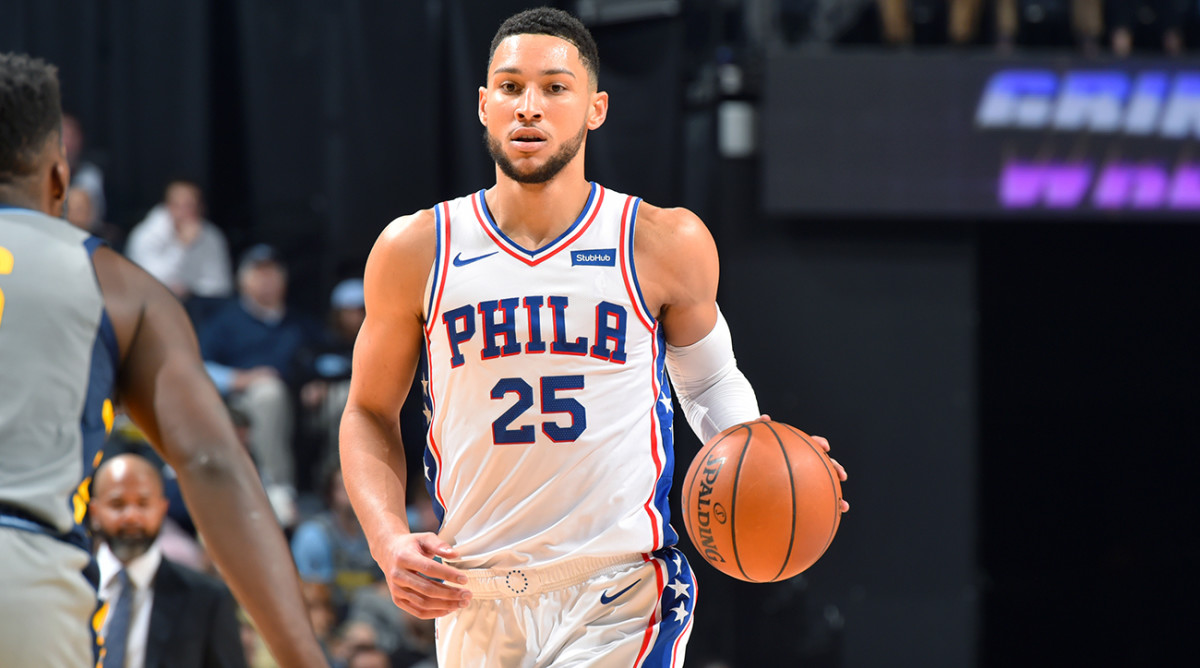Even With Jimmy Butler in Town, Ben Simmons Will Decide the Ceiling in Philadelphia

Credit to the 76ers for staying on brand. Saturday's trade for Jimmy Butler gives them all kind of tantalizing possibilities as a playoff team and potential Finals contender. And then, of course, there's also a chance that all of this will be remembered as a spectacular failure. For a team that is on its third GM in four years, The Process has been remarkably consistent, and it has never been boring. Butler gives the Sixers a weapon that can scare the entire league, and while the fit will be complicated on the court and on the balance sheet going forward, it's a risk that made sense.
The Sixers' window to contend may have opened earlier than expected, but it was also closing quicker than outsiders realized. Because of a massive Joel Embiid contract extension and a similarly exorbitant extension that will be due Simmons in 2020, Philadelphia's cap space—and room to add another star—was due to disappear after this summer. At the same time, given the realities of this offseason—Klay Thompson, Khris Middleton, Kawhi Leonard are all unlikely to choose the Sixers—the chances of adding a third star in free agency were not great.
As for internal growth, the Markelle Fultz experiment is not over, but it hasn't been working. The rest of the Eastern Conference contenders improved over the summer, while the Sixers had clearly plateaued. Philly deserves credit for conceding that the current team wasn't good enough. Joel Embiid is in the middle of his prime and playing like an MVP, and it would have been a waste to bet the rest of the season on Wilson Chandler and Mike Muscala.
NADKARNI: Grading 76ers Deal for Jimmy Butler
As a survivor of multiple tours of Thibs duty, Butler's health will be worth monitoring. His place in the locker room will be its own adventure. If he's signed to anything close to the full, five-year, $190 million max, his contract will be a bad deal as soon he signs it, and it will only get worse from there. The bottom line, however, is that the Sixers had no other path to a third star, and without one, there was no path to real contention.
Philly will still have room to add pieces this season, and Elton Brand will stay busy looking for deals that can add some short-term depth to a team that just lost two valuable pieces of the rotation. Likewise, if Brand can clear out room before next July, there could be significant money to throw at free agents. And while signing Kawhi Leonard or Klay Thompson isn't any more realistic than it was before this weekend, now that Philly can recruit players to join Embiid, Simmons, and Butler, there's a chance that a second-tier free agent like Kemba Walker could view the Sixers as his best path to contending for a title. Even if that money doesn't go to an All-Star, there's room to fill out the rotation and come back with even more firepower next year. Going all-in this season won't necessarily preclude Philly from getting creative going forward.

All of the logic makes sense. But if the question is whether this move might actually work, the conversation shifts from Butler and Embiid and Brand. Ben Simmons will decide the ceiling in Philadelphia.
The second this trade was announced, there was hand-wringing all over basketball twitter. How will they space the floor? Can those stars co-exist? What's the pecking order? If the Sixers are paying $100 million to Simmons, Embiid, and Butler, can that team make the Finals?
Really, these are all questions about Simmons. Everyone knows that Joel Embiid, if he's healthy, will give the Sixers something close to MVP-level production. Everyone knows that Jimmy Butler, if he's healthy, will provide All-NBA two-way excellence on the wing. His ball dominance can sometimes complicate his fit on offense, but he's generally great enough to make the deal worthwhile. That should continue in Philly. At this point in Jimmy Butler's career, we know what we're getting.
MAHONEY: Breaking Down Jimmy Butler's Fit With 76ers
The variable is Simmons. He has the highest upside of anyone on the roster, but with Butler in Philadelphia, he'll have the toughest job. He's already been struggling thus far this season. After melting down against the Celtics last spring, he returned this season without any clear improvement to his jumpshot or diversity in his offense. In fact, if diversity is the goal, his game has regressed. Where last season he attempted 17% of his shots from between 10 and 16 feet and connected on 31% of those shots, this year that number is less than 1% and he's shooting 16% on those jumpers. He still doesn't get to the free throw line as much as he should—given his size and proximity to the rim—and his free throw shooting is slightly improved, but still suboptimal (61% thus far). There are times where it's clear Simmons is avoiding contact that might send him to the line.
"A guy like him," Simmons said of Butler this weekend, "[He] can come in and score the ball. Veteran leadership, experience. He's going to fit in here."
The key to the fit in Philadelphia will be how Simmons address his weaknesses. He can either improve or adapt. The former option would mean refining his jumpshot and becoming a viable threat outside the paint, keeping defenses honest, and giving Butler and Embiid the space they'll need to dominate. The latter option, adapting, would mean embracing a role as kind of super-charged Draymond Green. He could set screens for Butler and then crash to the rim and pick defenses apart with passing. That can work, but Simmons would need to be comfortable dominating by doing the little things—elite defense, passing, rolls to the basket that don't always end with points. Also, Green hasn't been a good shooter for the Warriors in several seasons, but he's at least willing to shoot and be a threat.
If Simmons stays the same, the whole team will struggle. Granted, the Sixers probably have enough talent to finish in the top half of the East regardless, and Brett Brown will be able to stagger lineups such that spacing concerns are mitigated. In the short term, the new Sixers should be awesome. But to hit its ceiling in the playoffs, the core of this team will need more diversity on offense. Butler and Embiid can close games for them, but their value becomes more complicated if smart defenses are sagging off Simmons and clogging the paint. Likewise, if Simmons insists on initiating the offense, Butler can only help so much.
GOLLIVER: 76ers Must Win After Jimmy Butler Trade
Improving his jumper would likely be a years-long process, so in that case, it will be interesting to see how much Simmons is willing to bend when it comes to his short-term role. "I think to anoint him—'you're only a point guard forever'—is not in my mind," Brown told reporters last March. "I think it's going to be a one (point guard) or a four (power forward), that's where I see him."
"Definitely a one, not four," Simmons said when he heard those comments from his coach. "I don't want to play a four. I mean, I'll play the four but I don't want to be predominantly in the four position because I feel like I can do a lot more from the point guard position, as you've seen."
If Simmons can evolve and embrace a refined role next to Embiid and Butler, the Sixers could be terrifying. If he can't, there will be high expectations all winter that won't be met in the spring, and then all bets are off. There's always a chance that Simmons helps the Sixers more as a trade asset than a superstar sidekick. At the moment all we know is this: There is a ton of pressure to evolve. Solutions won't be simple. Scrutiny will be high. There are reasons for any objective observer to be skeptical of where this is headed, but if he can walk the line between growth and sacrifice, there is a real opportunity to blitz the entire league.
And however this ends, everything we know about Simmons is also true of the Sixers.
